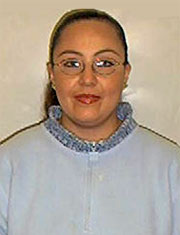Arcadia lives with her husband and daughter and speaks Spanish with them. Her daughter attends a preschool where she is able to speak her home language. In the context of a question about where she might use English, Arcadia suggests that, at least at that time (2006), her daughter's schooling would not provide a context for English language use.
| I: | And your children's teacher? | |
| Arcadia: | They are all Hispanic. | |
| I: | Oh they are all Hispanic? | |
| Arcadia: | Yes. | |
| I: | Where do you go? What school does your daughter go to? | |
| Arcadia: | It's called [name of place in Hillsboro…completely Hispanic. | |
| I: | Do you know any other parents or families who speak English? Any Americans who go to the same school? | |
| Arcadia: | The problem is that there are very few children who are American. | |
| I: | Oh, the majority are Hispanic in the school she goes to? | |
| Arcadia: | Yes, and I don't know many of the other parents because just come to pick up their children and they leave; but Hispanic people are more involved in the schools. | |
| Hide Conversation | ||
While the use of English with her daughter's teacher (in 2006) may not have been a priority, in surveys given in 2003 and 2004, Arcadia indicated that one of the main reasons she was learning English was so that she could communicate with her daughter's teacher and help her daughter with her homework in the future.
Although she reported on surveys that she was learning for the sake of her daughter's education, when asked directly about how her family influences her English language use and learning, Arcadia expressed a strong degree of personal responsibility for her own learning.
| I: | In what way does your family help you or hinder you from learning English and getting used to life in the United States? (Repeats question) | |
| Arcadia: | Well I believe that my family is not what impedes us from learning. We limit ourselves when we don't want to learn or adapt to new things. | |
| I: | So you think that it has to do with yourself, not the family? | |
| Arcadia: | I think that it's the personal decisions one makes. Understand, I think that neither my husband nor my daughter can influence my decisions to start adapting or wanting to be something more. | |
| Hide Conversation | ||
So while she did give her daughter's education as one reason for studying English, in the sense of an aid to learning, Arcadia does not place her family into such a category.
Her extended family plays a conflicting role with respect to English language use and learning. Arcadia keeps in touch with her family in Mexico and reports calling them every week. In that sense, she maintains an identification with Mexico. She reports, however, that her family members in Mexico have a overly positive idealization of the United States and the benefits of English learning.
